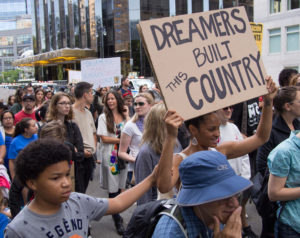Get to Know DACA and Dreamers
As we work on behalf of our children and families, it’s important to be informed! Here are 5 myths about DACA and Dreamers and why they’re wrong.
 Myth 1: DACA is a pathway to citizenship
Myth 1: DACA is a pathway to citizenship
DACA (Deferred Action for Childhood Arrivals) is a program that gives beneficiaries a temporary reprieve from deportation, allowing them to stay lawfully in the country, granting work permits and allowing them to obtain driver’s licenses. The program is not amnesty, nor is it a path to become a U.S. citizen or a legal permanent resident. Those protected under DACA are known as Dreamers. Under DACA, Dreamers are able to reside legally in the U.S. for two years and then apply for renewal.
Myth 2: DACA Recipients don’t pay taxes
DACA recipients, or Dreamers, have paid about $2 billion in state and local taxes according to the Institute on Taxation and Economic Policy. They do so using their Individual Taxpayer Identification Number (ITIN) because they are not eligible for Social Security Numbers.
Myth 3: They get Medicaid and Obamacare
Under DACA, Dreamers are not eligible for Medicaid or Obamacare. The only other ways for Dreamers to get health insurance is by receiving it from an employer, being a spouse’s dependent, going to a community clinic or purchasing it on their own, paying the entire premium.
Myth 4: Dreamers go to college for free
DACA students are not eligible for federal financial aid, though some states let them pay in-state tuition, and a few offer them state-sponsored aid. Public and private universities handle students in different ways. In some states, universities block undocumented students from attending college as residents and from getting financial aid. Some private institutions prefer to enroll them as international students, who in some cases pay thousands of dollars more than domestic out-of-state students. In states that have no official policy, undocumented students often pay out-of-state or international rates for college.
Myth 5: They’re stealing jobs from American citizens
In 2017 the U.S. Federal Reserve announced a shortage of qualified workers in the U.S. Currently 6 million jobs remain unfilled in the U.S.—a record high—despite DACA recipients being employed. Experts say ending protections for DACA recipients would worsen the shortage of workers in the country.
If you care about supporting DACA, please write or email your legislators today and ask for their help!

